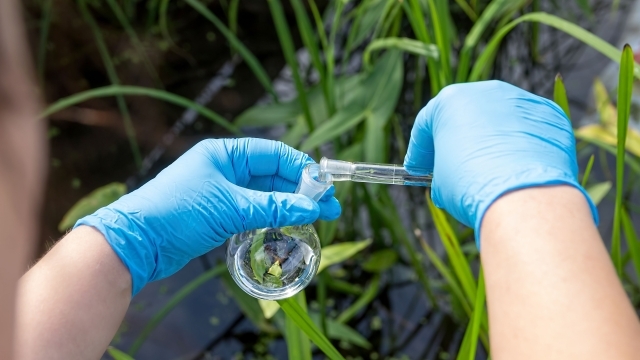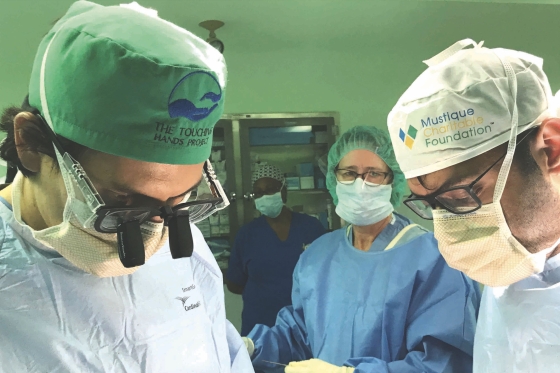

UG
Chemistry, Bachelor of Science
As a Chemistry major, you will graduate with a wide array of career possibilities in the chemical, environmental, health, and pharmaceutical industries.
- Home
- Academics
- Majors and Programs of Study
- Chemistry, Bachelor of Science
As a Chemistry major, you will graduate with a wide array of career possibilities in the chemical, environmental, health, and pharmaceutical industries. While at St. John’s you will work side by side with expert faculty in small classes and laboratories in a program committed to ensuring your professional and personal success.
Whether you are considering a career in laboratory research, education, or management, the Bachelor of Science (B.S.) in Chemistry at St. John’s offers you a comprehensive education in the sciences. You can also pursue a combined B.S./M.S degree in chemistry, as well as several B.S./M.S. pathways which may allow you to receive both a B.S. and an M.S. degree in five years. As a Chemistry major, you may be eligible to pursue pathways to graduate programs in the School of Education.
Along with traditional classes, you study the growing fields of organic chemistry, organometallics, and separation techniques, as well as subjects ranging from genetics to bioorganic chemistry. Many of our students explore research opportunities in chemistry or related fields at St. John’s and at other institutions.
Available at the University's Queens campus, the B.S. Chemistry programs includes a core curriculum with three options:
- B.S. in Chemistry
- B.S. in Chemistry with American Chemical Society Certification
- B.S. in Chemistry with Biochemistry concentration
- Degree Type
- BS
- Area of Interest
- Science & Mathematics
- Associated Colleges or Schools
- Program Location
- Queens Campus
- Required Credit Hours
- 120
Admission
For more information about admission to this and other acclaimed undergraduate programs at St. John’s University, please visit Undergraduate Admission.
Department Contact
Teaching Laboratories
As a Chemistry major at St. John's, you gain a solid foundation in the theory and application of scientific concepts and principles.
You learn and are mentored by an enormously gifted, internationally-known faculty of scholar-teachers who care about each student's progress. Faculty encourage students to serve as research partners in the University's recently upgraded chemistry laboratories.
For example, you may conduct research in the Chemistry department's five specialized teaching laboratories, which feature high-tech 400 MHz NMR equipment. The primary instrument room includes the latest IR Spectrophotometers, a GC-MS, UV-Vis Spectrophotometers, a Fluorescence Spectrometer, a Differential Scanning Calorimeter and two HPLC's.
Courses
To earn a B.S. in Chemistry, you complete 120-credits, including core, major sequence, and elective requirements. The major sequence and elective requirements are outlined below.
All Chemistry students complete the major requirements below. You also may select Option I, II, or III.
| Course | Title | Credits |
|---|---|---|
| CHE 1210 | General Chemistry I | 5 |
| CHE 1220 | General Chemistry II | 5 |
| CHE 2230 | Organic Chemistry I | 5 |
| CHE 2240 | Organic Chemistry II | 5 |
| CHE 3250 | Quantitative Analysis | 4 |
| CHE 3270 | Physical Chemistry I | 3 |
| CHE 3280 | Physical Chemistry II | 3 |
| CHE 3300 | Instrumental Methods of Chemical Analysis | 4 |
| CHE 3321 | Experimental Physical Chemistry | 3 |
| CHE 3340 | Advanced Inorganic Chemistry | 3 |
| CHE 4341 | Introduction to Inorganic Synthesis | 2 |
In addition to the Chemistry major sequence, all science majors take the following:
| Course | Course # | Credits |
|---|---|---|
| MTH | 1730 | 4 |
| MTH | 1740 | 4 |
| PHY | 1930 | 4 |
| PHY | 1940 | 4 |
The B.S. Chemistry programs includes a core curriculum with three options:
- B.S. in Chemistry
- B.S. in Chemistry with American Chemical Society Certification
- B.S. in Chemistry with Biochemistry concentration
Option I — 45 Credits
Select one of the following:
| Course | Course # | Credits |
|---|---|---|
| CHE | 3330 | 3 |
| CHE | 4351 | 3 |
| CHE | 4361 | 3 |
| CHE | 4903 | 3 |
| CHE | 3390 | 3 |
Or a 100 level graduate CHE course
Option II (American Chemical Society Certification) — 49 Credits
Select one of the following in addition to CHE 3390:
| Course | Course # | Credits |
|---|---|---|
| CHE | 3330 | 3 |
| CHE | 4351 | 3 |
| CHE | 4361 | 3 |
| CHE | 4903 | 3 |
| CHE | 3420 | 3 |
| CHE | 3431 | 3 |
Or a 100 level graduate CHE course
Option III (Biochemistry Concentration) — 49 Credits
Select one of the following:
| Course | Course # | Credits |
|---|---|---|
| CHE | 3390 | 3 |
| BIO | 3470 | 3 |
We highly recommend the following electives:
| Course | Course # | Credits |
|---|---|---|
| CHE | 3330 | 3 |
| BIO | 3320 | 3 |
Additional Information
You gain a strong academic and professional edge by joining any of our more than 180 student clubs and organizations. Clubs and honor societies of particular interest to Chemistry majors include:
- American Chemical Society (ACS)
- Roger Bacon Scientific Honor Society
- Watson Pre-Health Honor Society
The Skull and Circle Honor Society and the Lambda Kappa Phi Honor Society annually select students from St. John's College of Liberal Arts and Sciences who combine scholarship, integrity, and dedicated service to the St. John's community.
Every student at St. John's benefits from outstanding University-wide facilities and resources including high-tech classrooms, laboratories, and our 1.7 million-volume University Library. Our D’Angelo Center is a five-story, 127,000-square-foot University and Student Center with classrooms, lecture halls, a Starbucks Café, and a full-service food court.
All students take advantage of St. John’s location in dynamic New York City. Our faculty and Career Services have strong ties to employers and other professional and educational resources throughout the New York area.
American Chemical Society Approval
The Chemistry program is annually reviewed by the American Chemical Society (ACS) and an ACS-certified degree option is available. This approval ensures that you will receive a solid foundation needed to meet your career goals and that employers and graduate and professional programs will know you are well prepared to succeed in their programs.
Our Alumni
Student Stories
Soccer Star Turned Orthopedic Surgeon Serves At-Risk Populations
Hand surgeon Jeffrey G. Stepan, M.D. ’08C first heard the call of service at St. John’s University—and continues to answer it today. A native of California, Dr. Stepan recalled that the combination of the University’s high-quality academics and diverse offerings in athletics attracted him to St. John’s, as well as the opportunity to study in New York City.
Highlight
Dr. Stepan, a Chemistry major, played on the Men’s Soccer team under heralded coach David Masur ’03Ed.D., whom he considers a profound influence. “He constantly pushed us to our limits, and sometimes a little bit beyond,” Dr. Stepan explained. “That was instrumental in overcoming any difficulties I had with academics, and the lessons he taught served me well in my career. He definitely made me more resilient.”
Department Faculty
Please see a list of our Chemistry faculty.
Interested in Science & Mathematics, but not sure if Chemistry, Bachelor of Science is right for you?
Related Programs
UG
The Bachelor of Science in Biochemistry provides you with a comprehensive curriculum that prepares you for graduate school or a career in health, or the biotechnology, pharmaceutical, or cosmetic industries.
- Queens Campus
GR
The widely-respected Master of Science (M.S.) program in Chemistry at St. John’s will prepare you for a career in industry, education, government laboratories, or private research, or to pursue a doctoral degree in the field.
- Queens Campus
UG
The Department of Chemistry offers an intensive, accelerated, combined degree program leading to both the Bachelor of Science (B.S.) and the Master of Science (M.S.) degrees in five years of full time study.
- Queens Campus


